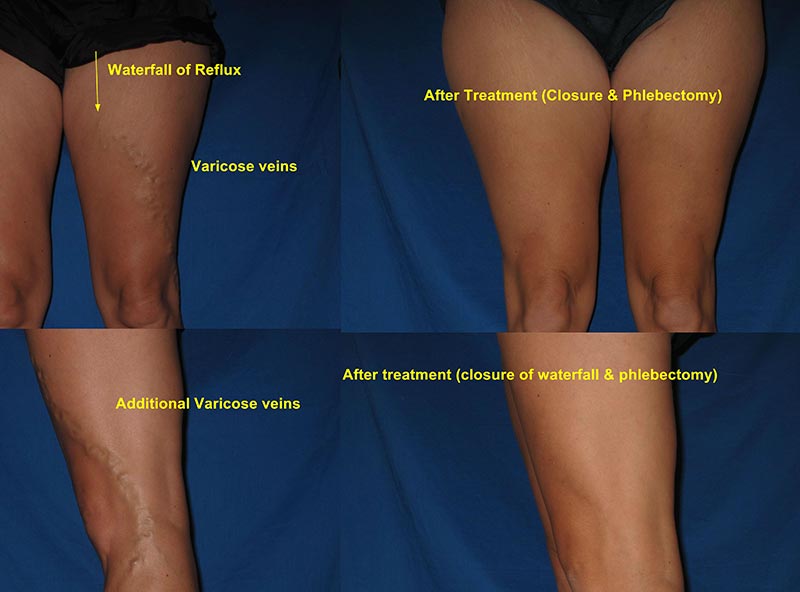Early Pregnancy Health Tips
this post originally appeared on VeinSpecialists.com:
Having a baby is one of the most rewarding things that you will ever do. If you’re considering starting a family or have just found out that you’re pregnant (Congratulations!), there are some things that you will want to keep in mind for both your health and your baby’s.
- Early Pregnancy Health Tips
- Varicose Veins in Early Pregnancy
- Poor Circulation: An Early Pregnancy Symptom
- Small Blood Clots in Early Pregnancy
Early Pregnancy Health Tips
Since the moment you found out that you’re pregnant, you’ve probably been reading anything you can get your hands on about early pregnancy symptoms, or you’ve had every woman you know offering you warnings and advice about what to expect. You know that you will likely experience insane cravings (pickles and ice cream, anyone?) and that fluctuating hormones will likely have you going from “on top of the world” to “clinically depressed” at the drop of a hat, and that’s to say nothing of the morning sickness, exhaustion, swollen feet and legs, and all sorts of other “fun” stuff.
We all know that smoking, drinking, caffeine and seafood are pregnancy no-nos, but you’ll likely have additional concerns. At your first appointment with your OB GYN, you will get more information about how to keep yourself and your baby healthy–you will talk about vitamins, including folic acid and DHA intake, you will outline a diet together and it will be your time to ask questions in the hopes of dispelling some of those crazy pregnancy myths you’ve been hearing.
However, there are some aspects of pregnancy that don’t get much coverage either in popular culture or through word of mouth. Many expectant mothers don’t realize the strain that pregnancy can put on their cardiovascular health and the venous system in particular, even before the baby begins to grow and the mother begins to gain weight.
Varicose Veins In Early Pregnancy
One of the many early pregnancy symptoms that usually don’t get talked about until much later in pregnancy is varicose veins, enlarged veins that appear near the skin’s surface, on the legs.
While most people think that they are caused by weight gain during pregnancy, this is not always the case. Even during early pregnancy, a woman’s hormones are in overdrive, and this hormonal hyperactivity can be a cause. Additionally, women who spend a great deal of time sitting are at greater risk.
Early Pregnancy Health Tips to Prevent Blood Clots, Varicose Veins, and Spider Veins
Having a baby is one of the most rewarding things that you will ever do. If you’re considering starting a family or have just found out that you’re pregnant (Congratulations!), there are some things that you will want to keep in mind for both your health and your baby’s.
- Early Pregnancy Health Tips
- Varicose Veins in Early Pregnancy
- Poor Circulation: An Early Pregnancy Symptom
- Small Blood Clots in Early Pregnancy
Early Pregnancy Health Tips

Since the moment you found out that you’re pregnant, you’ve probably been reading anything you can get your hands on about early pregnancy symptoms, or you’ve had every woman you know offering you warnings and advice about what to expect. You know that you will likely experience insane cravings (pickles and ice cream, anyone?) and that fluctuating hormones will likely have you going from “on top of the world” to “clinically depressed” at the drop of a hat, and that’s to say nothing of the morning sickness, exhaustion, swollen feet and legs, and all sorts of other “fun” stuff.
We all know that smoking, drinking, caffeine and seafood are pregnancy no-nos, but you’ll likely have additional concerns. At your first appointment with your OB GYN, you will get more information about how to keep yourself and your baby healthy–you will talk about vitamins, including folic acid and DHA intake, you will outline a diet together and it will be your time to ask questions in the hopes of dispelling some of those crazy pregnancy myths you’ve been hearing.
However, there are some aspects of pregnancy that don’t get much coverage either in popular culture or through word of mouth. Many expectant mothers don’t realize the strain that pregnancy can put on their cardiovascular health and the venous system in particular, even before the baby begins to grow and the mother begins to gain weight.
Varicose Veins In Early Pregnancy
One of the many early pregnancy symptoms that usually don’t get talked about until much later in pregnancy is varicose veins, enlarged veins that appear near the skin’s surface, on the legs.
While most people think that they are caused by weight gain during pregnancy, this is not always the case. Even during early pregnancy, a woman’s hormones are in overdrive, and this hormonal hyperactivity can be a cause. Additionally, women who spend a great deal of time sitting are at greater risk.
Varicose veins are certainly unsightly, but worse, they are uncomfortable. Fortunately, however, there are ways that they can be prevented and treated. First and foremost, exercise. If you were already active prior to becoming pregnant, great! Keep at it! You will want to scale your activity back though, so talk to your practitioner about a level of exertion that’s safe for you and your baby.
If you weren’t particularly active before you were with child, it’s not too late to start. In addition to helping the circulatory system, exercise can ameliorate your delivery and help you regain your pre-baby shape after you’ve given birth. However, be sure not to start any exercise regimen without talking to your practitioner.
One of the best things that you can do for your legs, and for your pregnant self, is also one of the easiest–put your feet up. Be sure that your feet are elevated above your heart whenever possible. Not only does it do wonders for your venous system, but it also feels divine to take all that pressure off your feet and legs.
Finally, another method of prevention and treatment is to wear compression hose. Compression hose often look like nylons, but they are specially constructed to promote optimal blood flow, which can help to combat poor circulation in early pregnancy and beyond. At Vein Specialists of the South, we recommend that women begin wearing compression hose and other compression garments (sleeves and leggings, for example) as soon as they find out they’re pregnant to help avoid the development of varicose veins, spider veins and other effects of circulation during pregnancy. And remember, if you still develop varicose veins despite your best efforts (they are genetic, after all), we can treat them after you’ve recovered from childbirth here in our Macon vein health practice.
Poor Circulation: An Early Pregnancy Symptom
Like almost all of the changes a woman’s body goes through during early pregnancy, poor circulation can be partially blamed on overactive hormones. However, there’s more to it than that. During pregnancy, almost all of your body’s daily inner-processes begin to slow down. This makes it hard for the body to keep blood flowing at its normal pre-pregnancy rate. This is further compounded by the increased blood volume during pregnancy, which makes the general circulation process no picnic for your already taxed body.
One of the best ways to improve circulation is to elevate your legs whenever possible. It’s harder for the circulatory system to get the blood from your toes back up to your heart than it is for it to flow downward; elevating your legs allows gravity to assist your blood flow back toward the heart.
Wearing compression hose also helps to improve circulation. They put specially localized pressure on your veins through graduated compression. This helps coax blood flow back up toward the heart. Again, it’s important to wear compression garments before you ever begin to experience symptoms like varicose veins and spider veins. Compression hose are the easiest way to prevent venous disease and should be worn regularly once you discover you’re pregnant.
Video: When Should Pregnant Women Wear Compression Hose Or Stockings?
Of course, nothing gets the blood pumping like exercise. Even if it’s something as simple as a short walk, physical activity strengthens the heart and promotes blood flow. If your other early pregnancy symptoms like nausea and exhaustion are taking their toll and a walk just isn’t in the cards right now, that’s okay. There are plenty of low-impact exercises that you can do. Simple leg lifts are great, and doing step-ups using a stair are easy and beneficial. Try sitting and flexing your calf muscles a few times per day. Flexing the muscle, not just moving the legs around, stimulate blood flow and better circulation to help prevent venous disease. Finally, extended use of compression hose will help if you’ve confined yourself to your bed, curled up with a box of saltines due to typical early pregnancy symptoms.
Small Blood Clots In Early Pregnancy
 An early pregnancy symptom that very few people talk about or even know of are small blood clots in the legs. One of the reasons that pregnant women are more likely to experience blood clots is that their bodies are busy preparing for childbirth, and this starts right away in early pregnancy. To slow the blood loss that occurs during labor and delivery, the blood increases its clotting capacity. Coupling that with more blood moving slower than usual will sometimes result in a small blood clot.
An early pregnancy symptom that very few people talk about or even know of are small blood clots in the legs. One of the reasons that pregnant women are more likely to experience blood clots is that their bodies are busy preparing for childbirth, and this starts right away in early pregnancy. To slow the blood loss that occurs during labor and delivery, the blood increases its clotting capacity. Coupling that with more blood moving slower than usual will sometimes result in a small blood clot.
Women who spend the majority of their time sitting down are more likely to develop small blood clots in early pregnancy than women who are more active. Women who are overweight may also be at a greater risk. Finally, women who fly frequently should be especially careful. The pressure changes of air travel, even despite the pressurized cabin, coupled with the long hours of sitting put pregnant women, who are already at an increased risk for a blood clot, at even greater risk. Avoid air travel if you can. If you can’t, be sure to get up and walk about the cabin as frequently as is safely possible. Wear your compression hose during the flight and pack several pairs for use during your trip.
Be sure not to confuse small blood clots with spider veins as some women sometimes do. Spider veins are a small cluster of very thin veins near the skin, usually on the legs, that look like a spider web. These are generally not dangerous; however, they can be an eyesore. The best way to prevent them is to keep your blood pumping with physical activity. If, despite your best efforts, you still develop spider veins during pregnancy, we can help with sclerotherapy treatments after you’ve recovered from childbirth.
Pregnancy is a thrilling time. Eating right and getting plenty of low-impact exercise will help keep you feeling great so that you can enjoy one of life’s greatest miracles–your new baby! Take care of your circulation, for the sake of your health and the health of your unborn baby, and report any unexplained leg pain, pressure, bulging veins, spider veins or heaviness in your legs to your OB GYN or give us a call if you feel you need specialty care. Don’t forget to stock up on compression hose, leggings and sleeves. Contact us today to order your compression garments. The sooner you wear them, the better!







